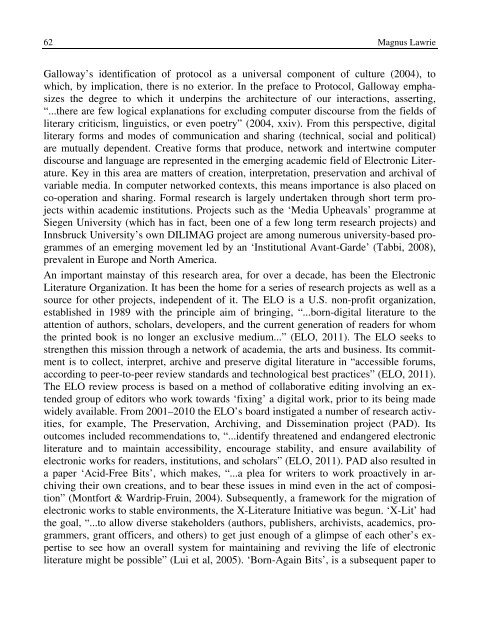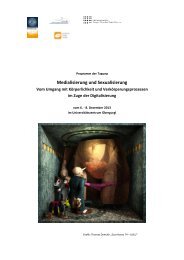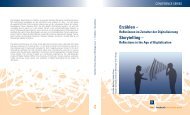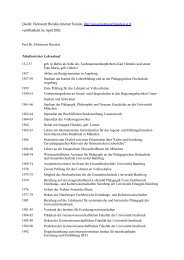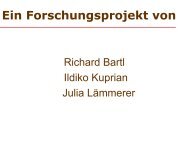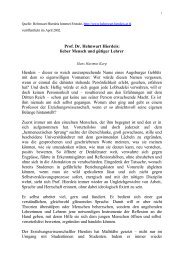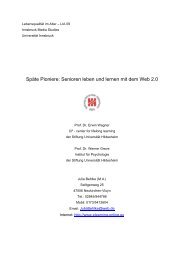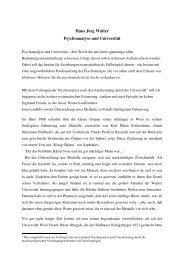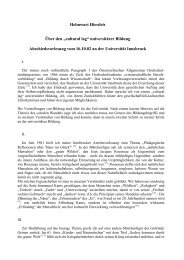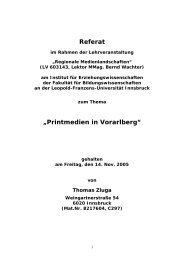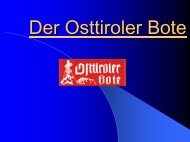Download pdf - Universität Innsbruck
Download pdf - Universität Innsbruck
Download pdf - Universität Innsbruck
Sie wollen auch ein ePaper? Erhöhen Sie die Reichweite Ihrer Titel.
YUMPU macht aus Druck-PDFs automatisch weboptimierte ePaper, die Google liebt.
62 Magnus Lawrie<br />
Galloway’s identification of protocol as a universal component of culture (2004), to<br />
which, by implication, there is no exterior. In the preface to Protocol, Galloway emphasizes<br />
the degree to which it underpins the architecture of our interactions, asserting,<br />
“...there are few logical explanations for excluding computer discourse from the fields of<br />
literary criticism, linguistics, or even poetry” (2004, xxiv). From this perspective, digital<br />
literary forms and modes of communication and sharing (technical, social and political)<br />
are mutually dependent. Creative forms that produce, network and intertwine computer<br />
discourse and language are represented in the emerging academic field of Electronic Literature.<br />
Key in this area are matters of creation, interpretation, preservation and archival of<br />
variable media. In computer networked contexts, this means importance is also placed on<br />
co-operation and sharing. Formal research is largely undertaken through short term projects<br />
within academic institutions. Projects such as the ‘Media Upheavals’ programme at<br />
Siegen University (which has in fact, been one of a few long term research projects) and<br />
<strong>Innsbruck</strong> University’s own DILIMAG project are among numerous university-based programmes<br />
of an emerging movement led by an ‘Institutional Avant-Garde’ (Tabbi, 2008),<br />
prevalent in Europe and North America.<br />
An important mainstay of this research area, for over a decade, has been the Electronic<br />
Literature Organization. It has been the home for a series of research projects as well as a<br />
source for other projects, independent of it. The ELO is a U.S. non-profit organization,<br />
established in 1989 with the principle aim of bringing, “...born-digital literature to the<br />
attention of authors, scholars, developers, and the current generation of readers for whom<br />
the printed book is no longer an exclusive medium...” (ELO, 2011). The ELO seeks to<br />
strengthen this mission through a network of academia, the arts and business. Its commitment<br />
is to collect, interpret, archive and preserve digital literature in “accessible forums,<br />
according to peer-to-peer review standards and technological best practices” (ELO, 2011).<br />
The ELO review process is based on a method of collaborative editing involving an extended<br />
group of editors who work towards ‘fixing’ a digital work, prior to its being made<br />
widely available. From 2001–2010 the ELO’s board instigated a number of research activities,<br />
for example, The Preservation, Archiving, and Dissemination project (PAD). Its<br />
outcomes included recommendations to, “...identify threatened and endangered electronic<br />
literature and to maintain accessibility, encourage stability, and ensure availability of<br />
electronic works for readers, institutions, and scholars” (ELO, 2011). PAD also resulted in<br />
a paper ‘Acid-Free Bits’, which makes, “...a plea for writers to work proactively in archiving<br />
their own creations, and to bear these issues in mind even in the act of composition”<br />
(Montfort & Wardrip-Fruin, 2004). Subsequently, a framework for the migration of<br />
electronic works to stable environments, the X-Literature Initiative was begun. ‘X-Lit’ had<br />
the goal, “...to allow diverse stakeholders (authors, publishers, archivists, academics, programmers,<br />
grant officers, and others) to get just enough of a glimpse of each other’s expertise<br />
to see how an overall system for maintaining and reviving the life of electronic<br />
literature might be possible” (Lui et al, 2005). ‘Born-Again Bits’, is a subsequent paper to


